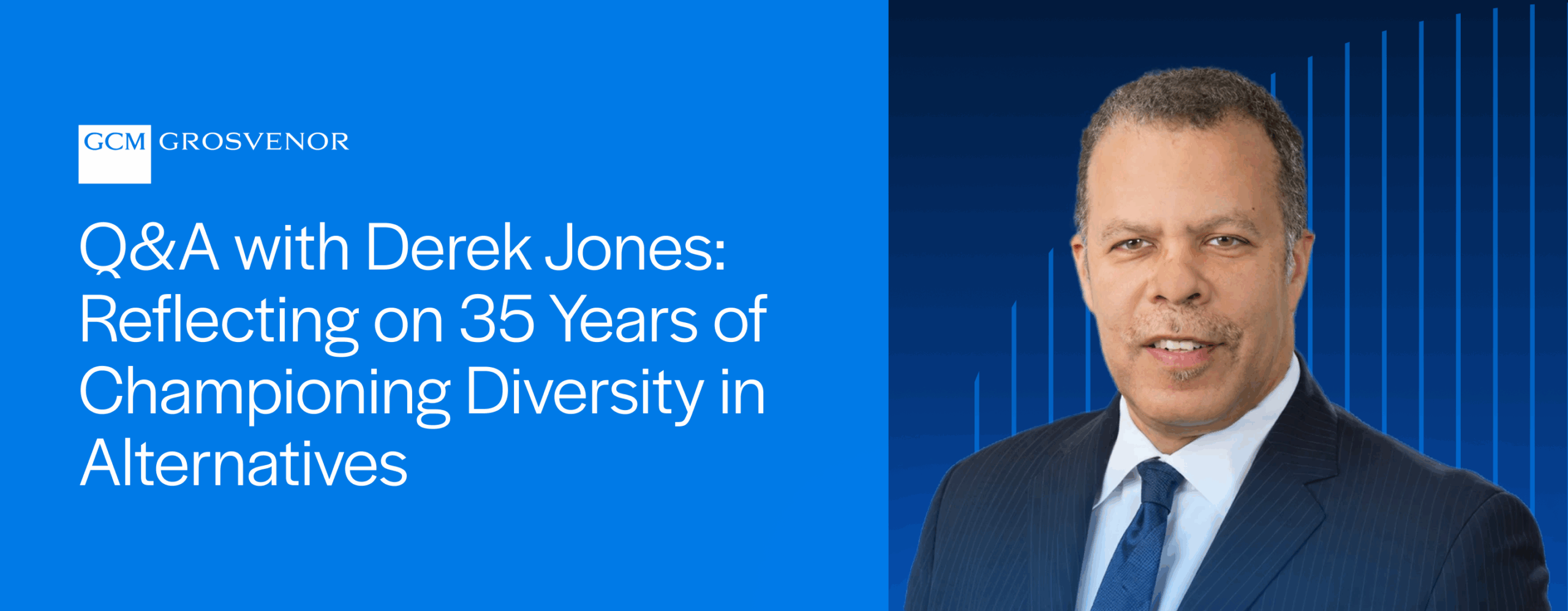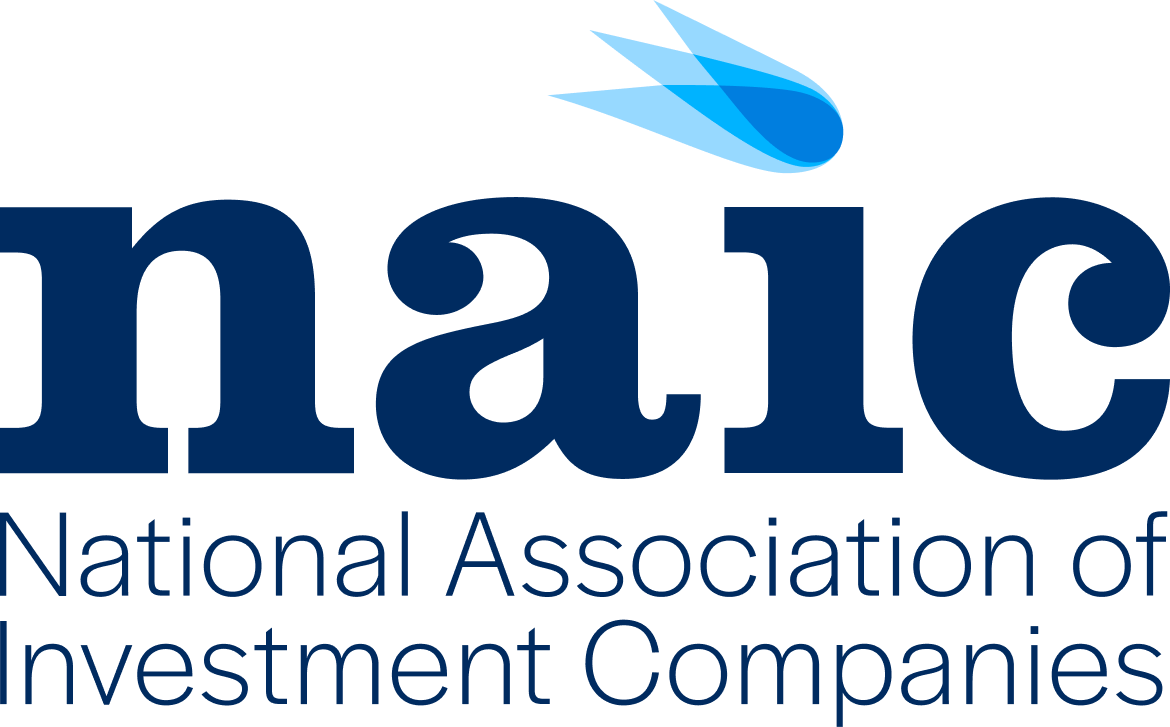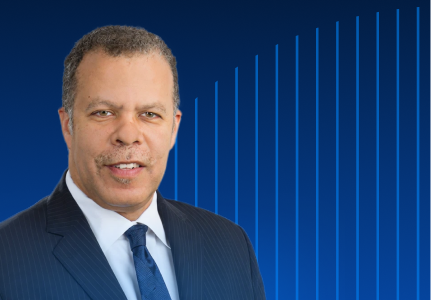
After 35 years of building and expanding access for historically overlooked managers in alternative investments, Derek Jones is stepping into a new chapter, having retired from GCM Grosvenor, where he served most recently as Vice Chairman.
Throughout his career, Jones held leadership roles at Prudential Equity Investors, Cornerstone Investors, Provender Capital, and Credit Suisse before joining GCM Grosvenor. From his days at Credit-Suisse through his tenure at GCM Grosvenor, he launched and led a pioneering investment practice built on the principle that high-performing underrepresented managers deserve fair and equal consideration. “Relentlessly based on merit,” as he describes it, the practice ultimately deployed billions to over 100 managers, who now collectively manage more than $350 billion in assets.
His impact extended far beyond his storied 11-year career at Grosvenor. As a board member for over 20 years, Jones helped shape NAIC into a national force with 175 member firms and over $447 billion in assets under management (AUM). He also founded NAIC’s Council of Billion Dollar Managers, creating a high-performing peer network rooted in shared insight and excellence.
In this exclusive conversation, Jones reflects on the lessons learned, the legacy he’s proud to leave behind, and the future he envisions for the next generation of investors.
NAIC: You’ve been one of the champions for inclusivity even before Grosvenor. How do you suppose your efforts over the years have helped reshape the industry for the next generation of diverse investors?
JONES: I think it’s just having more familiarity, a wide aperture, and a place to go. With examples in the marketplace, where many of these managers have gone on to become household names and establish their first line of business, growing those platforms to a significant level. The examples of outperformance, which we were fortunate to experience throughout the years that I was leading the practice of delivering outperformance, became a significant part of our underwriting activity. Grosvenor is a relatively large allocator of capital in the private equity market. Over the past five to six years, more than 40% of the underwriting allocations have gone to underrepresented managers. That came out of the practice that I led.
NAIC: As you look back at your career, what advice would you offer emerging leaders, especially those from underrepresented backgrounds, looking to create an impact in the industry?
JONES: There are no shortcuts, no entitlement in a highly competitive market, one in which you’ve got to have a differentiated strategy. You have to have done your training. It’s an apprentice business, so getting established and getting the fundamental skills from either investment banks or other private equity firms. Our diligence was the same diligence we would apply to any manager. In fact, arguably, maybe even tougher. I would say that any manager coming out should be focused on the team, the strategy, and the track record. And the performance has to be there. If the performance is not there as we benchmark it against others in the marketplace, it’s going to be a big challenge.
NAIC: What personal experiences most shaped your commitment to equity, inclusion, and finance?
“
Well, starting 35 years ago, there weren’t a lot of role models that looked like me, and I hadn’t thought about it when I got in the industry. The first week, I attended the National Venture Capital Association annual conference. There were 900 people, and I was the only person of color in the room. It dawned on me how selective it was, and it didn’t make sense that I would be the only person of color in the industry, so that was kind of a moment for me.
“
JONES: The second moment was this organization called NAIC. That was small 30 years ago, but I felt at home. There were others who looked like me who were at smaller firms. There, a kind of brotherhood formed, with a more familial feeling. That had a significant influence on my outlook and the opportunities available to people like me and others in the industry, so that was a momentous occasion as well.
I believe the third pivotal moment for me was when I was in the market as an independent sponsor. I had experience as a direct investor. I then left a firm, went to a smaller one, and I’ve worn a lot of hats. I became an independent sponsor, and then I interacted with some executives at Credit Suisse, who, at the right place and right time, wanted to expand the practice of identifying future leaders and entrepreneurs. I was hired to develop a focused approach toward allocating capital to emerging managers, the next generation of superstars. I had a particular focus on women and people of color.
NAIC: Walk me through the broad strokes of the early days of creating programs where you’re casting this wider net. How does one approach getting that started, especially at a time when there was no real guidebook to look at?
JONES: I think having an open door, getting the people in the room, and getting familiar with the managers was important. It was a smaller universe, and folks out there had smaller track records. So, having an open door and asking people to come in, sharing with them what was required from our firm, at that time, Credit Suisse and/or Grosvenor, to get an allocation. We shared those best practices, benchmarked the performance, and applied the same standards and process to these managers that we had applied to other managers. Part of it was that they just didn’t have a familiarity with what was required to get an allocation. I had to understand that, learn that, and then share that with this incredibly talented demographic that may not have had the relationships or experience in going through an investment process, but had the talent to make good investments.
NAIC: I prefer not to use the word’ legacy,’ so what do you suppose your lasting impact will be, given all that you’ve done over your decades in the business?
JONES: Like you said, legacy is a funny thing.
“
I would say I want to be known as someone who is helpful. There are two kinds of people: those who are helpful and those who are not. I want to be known as someone who is helpful, open, shares knowledge, is fair, and also someone who takes no shortcuts.
“
If people can say that about me, I would be happy to know that I was fair and helpful. I’d also say our strategy was early and impactful.
NAIC: What advice would you give young people looking to break into the industry?
JONES: I would work the alumni because there’s a network out there, and often, people don’t engage with it. So, I would work the network in a way, not necessarily looking for a job, but looking for advice. That way, people are a little more open and may be more willing to talk to you and share their knowledge about the industry. Over time, that can lead to some opportunities. Two, understanding what firms require in terms of background. Sometimes you see people that come in with a background, and it just is not going to be competitive, not that they aren’t talented, but it’s just not going to be competitive with the skillset that folks are looking for, and so understanding that and, if there are some shortcomings, trying to address that.
Very early on, I think experiential learning is key and important, so gaining an internship or earning college credit is beneficial. You don’t need to be in the big bulge bracket firm that’s only going to take three out of 2,000 applicants. There are a lot of smaller firms. There are endowments and family offices. There’s a wide range of providers in the marketplace that aren’t necessarily on Main Street, and that’s what we did when building the practice. We weren’t looking only on Main Street. We were looking all over the place for talent.
NAIC: Given the current state of anti-DEI efforts, what do you think the future of inclusion looks like?
JONES: These are my opinions and not the opinions of my former firm. I think there’s a doubling down from states, markets, and providers who have been invested in this space, believe in it, and have experienced the performance, and in many cases, outperformance, then you have the red states that weren’t going to do anything, weren’t interested, and can use the current environment as a reason certainly not to do any more or anything. I worry a little bit about the big fat middle, what’s in between there, where people were hearing more about emerging managers, more about the performance, but are concerned, given the environment, even given the use of words, could be misinterpreted and it could cause some paralysis temporarily, in terms of doing more in this space.
I think, ultimately, performance will win out. There are some extraordinary managers. I’ve seen these managers grow from very little to managing tens of billions of dollars, and so I’m optimistic.
“
I see the talent that has evolved from where we started this practice to where it is today, including the apprenticeships, the talent we have now, and the next generation, which includes people of color who are emerging from their own firms. When I started, I think there were probably 150 firms or so. Today, there are close to 2,000 underrepresented managers.
“
NAIC: What’s next for you?
JONES: Well, it’s the standard things, which are taking a much-needed break, relaxing, spending time with family, and traveling. There are two institutions that I’m becoming more and more involved in. One is I’m on the board of the Apollo Theater. I think there are extraordinary opportunities for that brand that should go well beyond 125th Street, so I’m working on a couple of exciting projects. It’s got new leadership, and there’s just a lot of excitement at what the Apollo Theater represents and the opportunities ahead.
The second area is that I’m on the advisory board of the Kogod School of Business, which is the American University’s Business School. I’ve gotten involved there, and with more time on my hands, I’m going to get more involved. Those two, and then I think I will likely pick up one or two board seats. Finally, I always have an entrepreneur that I’m supporting in some way, giving advice to, working with, and trying to help in some meaningful way. That combination will keep me busy.

